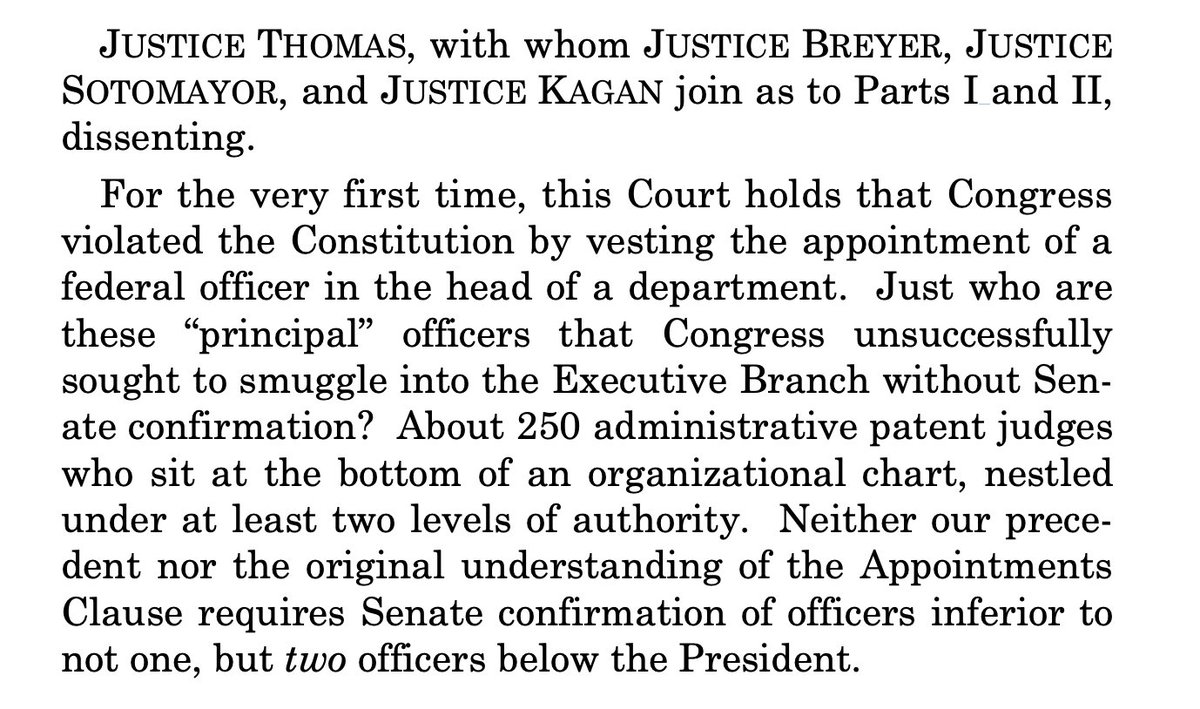The Supreme Court's first opinion of the day is in Goldman Sachs v. Arkansas Teacher Retirement System. Majority opinion by Barrett. There will be more opinions! supremecourt.gov/opinions/20pdf… 

Letting @LeahLitman summarize this holding because I did not follow the case, which involves a securities fraud class action.
https://twitter.com/LeahLitman/status/1406975628537180164
The Supreme Court's second decision of the day is in NCAA v. Alston. In an opinion by Gorsuch, the court *unanimously* upholds the district court's injunction against the NCAA based on "established anti-trust principles"! This is a big deal. supremecourt.gov/opinions/20pdf… 

!!! In a concurring opinion, Kavanaugh argues that *other* NCAA restrictions on student-athlete compensation and benefits—which are not at issue in this case—may also violate anti-trust law! supremecourt.gov/opinions/20pdf… 



Gorsuch: The NCAA "seeks immunity from the normal operation of the antitrust laws." But the court declines its request, noting that "this suit involves admitted horizontal price fixing in a market where the defendants exercise monopoly control." supremecourt.gov/opinions/20pdf…
There will be at least one more opinion, which could come from any justice except Barrett or Kavanaugh.
Last paragraph of Kavanaugh's concurrence:
"Nowhere else in America can businesses get away with agreeing not to pay their workers a fair market rate on the theory that their product is defined by not paying their
workers a fair market rate. ... The NCAA is not above the law."
"Nowhere else in America can businesses get away with agreeing not to pay their workers a fair market rate on the theory that their product is defined by not paying their
workers a fair market rate. ... The NCAA is not above the law."

The Supreme Court's FINAL decision on the day is un U.S. v. Arthrex, which has a very messy breakdown.
supremecourt.gov/opinions/20pdf…

supremecourt.gov/opinions/20pdf…


Remarkably, THOMAS, joined by the three liberals, dissents, arguing that the Appointments Clause does not require Senate confirmation of "officers inferior to
not one, but two officers below the President."
supremecourt.gov/opinions/20pdf…
not one, but two officers below the President."
supremecourt.gov/opinions/20pdf…

The upshot in Arthrex is (1) the Secretary of Commerce's appointment of judges to the Patent Trial and Appeal Board is unconstitutional, and (2) the remedy is that the director of the Patent and Trademark Office must be able to review the Board's decisions.supremecourt.gov/opinions/20pdf…
Arthrex is a prime example of how a 6–3 conservative majority makes a big difference. Thomas disagreed with the rest of the conservatives, and if RBG were still alive, this likely would've been a 5–4 decision going the other way. But picking off one conservative isn't enough.
Kavanaugh's concurrence in NCAA v. Alston should scare the hell out of the NCAA. supremecourt.gov/opinions/20pdf… 

Kavanaugh floats collective bargaining for student athletes (!!!) as a potential remedy for (what he sees as) the NCAA's widespread anti-trust violations.
supremecourt.gov/opinions/20pdf…
supremecourt.gov/opinions/20pdf…

• • •
Missing some Tweet in this thread? You can try to
force a refresh











